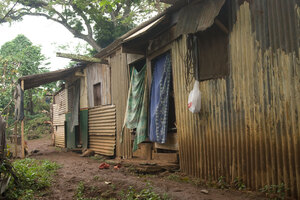One of the items in yesterday’s brain dump was a talk I presented to the Pacific Network Operators Group (PACNOG) at the Sebel Hotel. It’s titled ‘Network Effects: Social Significance of Mobile Communications in Vanuatu‘. It explains Network Effects and how they manifest themselves in village life, then looks at some obvious and not-so-obvious implications for network providers in the Pacific. Briefly, my point is that village life features very tight communication loops from which no one is exempt. The one-to-one (but not the one-to-many and many-to-one!) aspects of village communications will be enhanced by mobile comms, and smart network operators should do what they can to enhance this effect. The result will be that our island geography (and gestalt) creates more value per user than traditional business analysis might lead us to believe.
One of the questions that came up regularly when I asked for feedback on my talk was how people would be able to afford mobile services. Given that 5000 vatu (about USD 50) per month is not an unusual family income in the village, even topping up with 200 vatu credit (currently the smallest increment available) would be a burden, would it not? The answer is yes and no.
There’s an interesting relationship between commodity prices and agricultural production here in Vanuatu. When the price of commodities like coffee, copra and cacao rises, production actually decreases rather than increasing. The reason for this is that the need for cash in rural areas is quite limited. Once a villager earns enough to pay school fees, clothing and a few staples, there’s no more need to sell their crop. So when they can earn the same amount of money for less effort, they do so.
This is one of the factors leading to a kind of economic insulation for the average ni-Vanuatu. I wrote a bit more about other aspects of this phenomenon in this article for the Daily Post.The bottom line is that the cash economy remains small in rural Vanuatu because the cash economy is only a small part of the whole picture.
When mobile communications are introduced, the perceived need for cash increases. In the short term, this puts stress on the pocket book, but things can probably work themselves out through a nominal increase in the amount of cash being generated (e.g. through cash crops). Add to this the increased efficiencies that come hand in hand with better communications, and we’ll likely see more prosperity and economic activity – in cash terms – than less.
In other words, this is not a zero sum game.
That detail is still lost in many traditional planning processes. In fact, ignorance of this dynamic is a bigger inhibitor to growth than many other external factors. If people can’t forecast capacity properly, their estimates come out consistently low, and because products and services don’t meet the need, they don’t have the effect they’re intended to, so people don’t invest in them.
Very often, taking the last few years’ numbers and extrapolating linear growth creates a self-fulfilling prophecy in which growth remains linear only because that’s as much as it can grow. Unfortunately, it allows analysts to sit back and say, ‘See? I told you so.’
Update: Looking a little further down this continuum: Once the inherent economic elasticity in this system is used up, however, poverty sets in. An example would be people planting cash crops in places once reserved for food crops. It’s a fine line between building the cash economy and building dependence on the cash economy in such as way that a person’s outputs can’t meet their costs.

